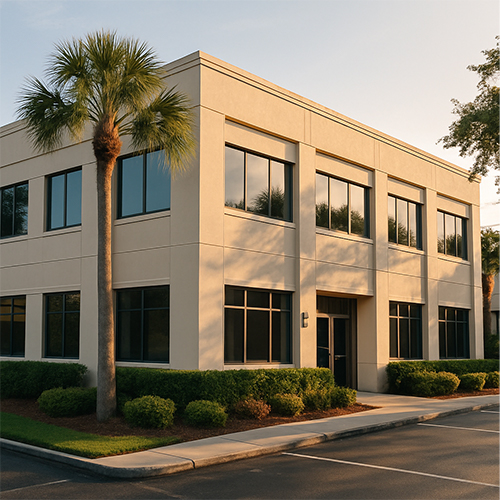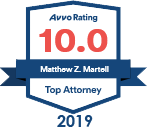Businesses In Divorces
Lakewood Ranch, Bradenton, Sarasota, & Venice, Florida Divorces Involving Businesses
 When a divorce involves a business, the stakes are high for both spouses. For the owner, the thought of losing control over something they have poured years of time, energy, and money into can be overwhelming. For the other spouse, a business may represent a significant marital asset that should be fairly valued and divided to protect their financial future. At the Law Offices of Matthew Z. Martell, P.A., we understand how complex and contentious these cases can be, and we are prepared to stand up for your rights— whichever side you are on. Divorce involving a business is not just about dividing property— it’s about safeguarding hard work, income, and long-term stability. These cases bring some of the toughest fights in family law courts, from determining whether a business is marital or separate property, to calculating its true value, to deciding whether it should be kept intact or divided. On this webpage, the Law Offices of Matthew Z. Martell, P.A. explain what you need to know about businesses in divorce, including how Florida law treats business property, the methods of valuation, and the options available for ensuring a fair outcome.
When a divorce involves a business, the stakes are high for both spouses. For the owner, the thought of losing control over something they have poured years of time, energy, and money into can be overwhelming. For the other spouse, a business may represent a significant marital asset that should be fairly valued and divided to protect their financial future. At the Law Offices of Matthew Z. Martell, P.A., we understand how complex and contentious these cases can be, and we are prepared to stand up for your rights— whichever side you are on. Divorce involving a business is not just about dividing property— it’s about safeguarding hard work, income, and long-term stability. These cases bring some of the toughest fights in family law courts, from determining whether a business is marital or separate property, to calculating its true value, to deciding whether it should be kept intact or divided. On this webpage, the Law Offices of Matthew Z. Martell, P.A. explain what you need to know about businesses in divorce, including how Florida law treats business property, the methods of valuation, and the options available for ensuring a fair outcome.
Understand How Florida Divorce Law Treats Your Business
Equitable Distribution in Florida — Florida follows the system of “equitable distribution” under Florida Statutes § 61.075. This means that when you go through divorce, the court looks at all marital assets and debts and divides them in a way that is fair, not necessarily equal. If your business is considered part of the marital estate, it can be divided or offset with other assets. The court examines many factors, including how long you were married, each spouse’s contributions, and the economic circumstances of both parties.
Marital Property Versus Non-Marital Property — Whether your business is subject to division depends on whether it is considered marital or non-marital property. Florida Statutes § 61.075 defines marital assets as those acquired during the marriage, including the appreciation in value of non-marital assets due to efforts made during the marriage. If your business started before marriage and stayed entirely separate, it may remain non-marital. But if your spouse contributed money, labor, or skills to grow the business during the marriage, part or all of it could be classified as marital.
Court’s Discretion in Dividing Assets — Judges have significant discretion when applying Florida Statutes § 61.075. The court may decide that one spouse keeps the business while the other receives money or property equal in value. The law requires written findings to explain why assets are divided a certain way. This helps make sure the outcome is fair based on your specific situation.
See If Your Business Is Marital or Separate Property
How Florida Law Defines Property Types — Florida Statutes § 61.075 explains the difference between marital and non-marital property. Marital property includes assets and debts gained during the marriage, no matter whose name is on them. Non-marital property usually covers things owned before the marriage or received individually as gifts or inheritance. When it comes to your business, this distinction is key to knowing whether it is subject to division in divorce.
Factors That Decide Marital or Non-Marital Status — The time of when you started or acquired your business matters a great deal. If you opened the business before marriage and kept it separate, it may remain your individual property. However, if you used marital funds to invest in it, or if your spouse helped manage, market, or grow it, then some or all of the business could be considered marital property. Appreciation in value caused by marital efforts is also treated as marital under Florida law.
Common Disputes Over Classification — Many disagreements come from blurred lines between personal and business contributions. For example, if your spouse did unpaid work for the business, that could support a claim that part of the business is marital. Similarly, if marital money was used for payroll, equipment, or expansion, that could shift classification. These disputes often require detailed financial records and sometimes expert testimony to untangle.
Why Classification Matters — Understanding whether your business is marital or non-marital is one of the first steps in divorce planning. If it is non-marital, you may be able to protect it entirely. If it is marital or partly marital, the court will include it in the equitable distribution process under Florida Statutes § 61.075. Because this decision has long-term financial consequences, having experienced legal guidance regarding this subject matter is essential.
Learn How a Business Is Valued in Divorce
Different Approaches to Valuation — Florida courts rely on expert methods to determine a business’s fair value. Common approaches include the income method, which looks at future earnings; the market method, which compares similar businesses; and the asset-based method, which adds up the value of physical and intangible assets. Each method has strengths and weaknesses depending on the type of business.
Role of Experts in Business Valuation — Forensic accountants and valuation experts often play a leading role in divorce cases involving businesses. They review tax returns, profit-and-loss statements, balance sheets, and industry data to prepare detailed reports. Judges often depend heavily on these expert opinions when deciding value.
Issues With Goodwill in Valuation — Florida courts draw a line between two types of goodwill: personal goodwill tied to an individual’s reputation or skill, and enterprise goodwill tied to the business itself. Under Florida law, personal goodwill is generally not divided in divorce, while enterprise goodwill can be. Distinguishing between the two often sparks disputes.
Handling Valuation Disagreements — Spouses may bring in different experts who arrive at quite different numbers. Florida courts must weigh competing testimony and evidence. The court’s decision under Florida Statutes § 61.075 aims to reach a fair result, but the complexity of business valuation often makes this one of the most contested issues in divorce.
Why Accurate Valuation Is Critical — The value assigned to your business directly impacts how other assets and debts are divided. A business that is undervalued could unfairly benefit one spouse, while an inflated value could create unreasonable financial pressure. A clear, well-supported valuation protects your financial future and helps avoid long-term disputes.
Know Your Options for Dividing a Business in Divorce
Buying Out Your Spouse’s Share — One of the most common solutions is for one spouse to buy out the other’s interest in the business. This allows the business to continue operating under one owner. The buyout amount is usually based on the business valuation determined under Florida Statutes § 61.075. Payments may be made in cash, through property exchanges, or by structured installment payments.
Continuing Co-Ownership After Divorce — Sometimes both spouses decide to remain co-owners even after divorce. While this is legally possible, it is often exceedingly difficult in practice. Divorce can strain communication, and then running a business together afterwards may not simply be sustainable. Florida courts strongly prefer cleaner solutions, but co-ownership may work when spouses have a strong professional relationship, are not fighting, and both want to keep the business running smoothly.
Selling the Business and Splitting Proceeds — Another option is selling the business to a third party and dividing the proceeds. This ensures a clean break, but it may take time to find a buyer, and the sale could disrupt employees and customers. Courts may consider this approach if neither spouse can afford a buyout or if keeping the business intact is not feasible.
Creative Settlement Solutions — In some cases, spouses reach creative agreements. For example, one spouse may keep the business in exchange for giving up a larger share of other marital assets such as real estate or retirement accounts. Florida Statutes § 61.075 allows flexibility as long as the overall division is fair.
Why Choosing the Right Option Matters — Each path has financial, tax, and personal consequences. The right choice depends on your resources, business type, and long-term goals. With guidance from your attorney and financial advisors, you can pursue an option that protects both your business interests and your financial future.
Protect Your Business Before and During Divorce
Using Prenuptial and Postnuptial Agreements — A prenuptial or postnuptial agreement is one of the most effective tools to protect your business. Under Florida Statutes § 61.079, spouses can make legally binding agreements that set out how property, including businesses, will be treated in divorce. These agreements can prevent disputes later by clearly stating whether a business will remain separate property.
Structuring the Business Wisely — The way you set up and operate your business can also affect its treatment in divorce. Keeping business and personal finances separate, maintaining proper corporate formalities, and avoiding the use of marital funds for business expenses can help support a claim that the business is non-marital property.
Keeping Clear Financial Records — Clean, detailed records are essential. Tax returns, balance sheets, payroll records, and loan documents help show how the business was financed and whether marital or non-marital funds were used. Without these records, it becomes harder to prove your case in court.
Temporary Orders to Protect the Business — During divorce proceedings, Florida courts can issue temporary orders to protect marital assets, including businesses. These orders may prevent either spouse from selling, transferring, or wasting business assets while the case is pending. This safeguard can help to ensure the business remains stable until final decisions are made.
Why Early Action Helps — Taking steps preferably before or secondarily during divorce to safeguard your business can prevent costly disputes and interruptions. The more prepared you are with agreements, records, and legal advice, the better chance you have of keeping your business intact and protected throughout the divorce process.
Understand the Tax and Financial Effects
Tax Issues in Business Division — When your business becomes part of divorce proceedings, tax consequences are often overlooked until it is too late. Under Florida Statutes § 61.075, property is divided through equitable distribution, but it is federal and state tax laws that determine how those divisions affect your wallet. For example, if one spouse is “bought out” of the business, the payment may be considered a transfer that triggers capital gains tax or other liabilities depending on how the transaction is structured. If the business itself is sold and the proceeds divided, both spouses may owe taxes on the gain. Even transferring certain assets, like equipment or real property owned by the business, can have tax effects. Because tax rules are complex and case-specific, professional tax advice is often needed to prevent expensive surprises.
Cash Flow Challenges for Business Owners — Divorce can create unique financial pressures for business owners. If you need to compensate your spouse for their share of the business, you may be forced to pull money out of the company, take out loans, or liquidate assets. This can strain operations, reduce working capital, or even put the business at risk if not managed carefully. In some cases, courts may allow structured buyouts over time to reduce immediate cash flow burdens, but you will need to demonstrate that the business can still meet payroll, service debt, and continue operating profitably. Balancing your personal obligations with your business needs is one of the toughest parts of this process.
Hidden Costs to Watch For — Beyond taxes and buyouts, other financial costs often arise. Hiring forensic accountants, business valuation experts, and lawyers adds to expenses. You may also face costs tied to restructuring the business, refinancing loans, or replacing your spouse’s labor or management role if they were actively involved. On top of these direct costs, divorce often causes lost productivity and emotional strain, which can affect decision-making and growth. These indirect costs may not appear on paper but can weigh heavily on long-term stability.
Why Planning Matters — Understanding the monetary impact of dividing a business is not just about protecting what you own now—it is about planning for the future. A poorly planned settlement can saddle you with tax debt, unstable cash flow, or obligations that undermine the health of your business for years. With early planning and the help of attorneys, CPAs, and financial advisors, you can create a strategy that minimizes risks, keeps your business running smoothly, and sets you up for financial stability long after the divorce is finalized.
Collaborating With the Right Professionals
Role of Your Divorce Attorney — Having a skilled divorce attorney by your side is critical when your business is on the line. Your lawyer will interpret Florida Statutes § 61.075 and apply it to your unique circumstances, making sure the court correctly classifies your business as marital or non-marital property. Your divorce lawyer will also gather and present evidence that supports your position, negotiate settlements with your spouse’s lawyer, and, if necessary, litigate aggressively to protect your business interests. Without strong legal representation, you risk losing far more than you should.
Value of Financial Experts — Divorce cases involving businesses almost always require the expertise of forensic accountant expert witnesses and CPAs. These professionals can dig into financial statements, tax returns, and bank records to uncover the true health and value of the business. They also identify whether marital funds contributed to its growth or if any assets were improperly used. A clear, well-supported valuation backed by a qualified expert witness is often the strongest evidence you can present in court. Financial expert witnesses also help project the long-term impact of buyouts, sales, or continued co-ownership, giving you a realistic picture of what each option means.
Why Expert Testimony Is Important — Judges are not business owners, accountants, or economists. They depend heavily on expert testimony to understand complex financial issues. If your spouse presents an expert witness opinion that undervalues the business, failing to counter with your own expert witness will leave you at a severe disadvantage. Courts tend to give much more weight to credible, well-prepared expert reports than to unsupported claims by the spouses. This makes expert witness testimony not just helpful, but often decisive.
Building a Strong Legal Team — Divorce that involves a business is never a simple “he said, she said.” It is a legal, financial, and personal challenge that requires a team approach. By combining the knowledge of an experienced and trusted divorce attorney with the technical skills of forensic accountant expert witnesses and financial advisors, you create a sturdy foundation for your case. This team not only protects your rights in court but also helps you make smart financial decisions that support the continued success of your business. Ultimately, surrounding yourself with the right professionals is one of the best investments you can make when your business and your future are at stake.
Take the Right Steps If You Own a Business in Divorce
Gather and Organize Financial Records — One of the first and most important things you can do is collect all of your business and personal financial records. Courts in Florida will need to review documents such as tax returns, balance sheets, profit-and-loss statements, and bank records to classify and value your business under Florida Statutes § 61.075. By preparing these records early, you reduce delays, strengthen your credibility, and give your attorney and experts the information they need to build your case.
Keep the Business Running Smoothly — Divorce is stressful, but you cannot afford to let your business operations slip. Customers, employees, and partners still rely on your leadership and stability. If the court sees that your business has lost value during the divorce process, it could complicate valuation or reduce what you ultimately retain. Keeping steady operations protects both your livelihood and your bargaining position.
Avoid Commingling Business and Personal Finances — Mixing business and personal funds can make it much harder to prove that your business is separate non-marital property. If you want to argue that your business is non-marital, you must show that you kept finances clearly separated. This means no paying personal expenses with business accounts, no depositing business income into joint marital accounts, and no blurring the lines between corporate and personal spending.
Why Early Legal Advice Helps — Speaking with a divorce attorney early in the process can help you avoid costly mistakes. Your divorce lawyer can guide you in protecting your business, advise you on what documents to prepare, and explain how to comply with court requirements without putting your operations at risk. Taking these steps now can save you considerable time, money, and stress later.
Frequently Asked Questions
What happens to a business in divorce in Florida?
In Florida, a business in divorce may be considered marital property under Florida Statutes § 61.075. If so, it becomes part of equitable distribution, meaning the court divides ownership or offsets value with other marital assets.
How is a business valued during divorce in Florida?
A business during divorce in Florida is valued using expert methods such as income, market, or asset-based approaches. Expert Witness Forensic accountants often testify, and courts decide value based on credible evidence, which directly affects asset distribution between spouses.
Can I keep my business in divorce proceedings?
Yes, in divorce proceedings you may keep your business if the court awards it to you. This may involve buying out your spouse’s share, offsetting it with other assets, or reaching a divorce settlement that protects your ownership rights.
Is my business considered marital property in Florida divorce?
Your business is marital property in Florida divorce if created during the marriage or expanded with marital funds or spousal contributions during the marriage. Appreciation during marriage may also be marital asset. If established before marriage and kept completely separate, it might remain your pre-marital property.
What role do experts witnesses play in businesses in divorce cases?
Experts play a vital role in businesses in divorce cases. Forensic accountants and CPAs analyze financial records, determine accurate valuations, and testify in court. Their findings often influence how judges classify, value, and divide a business between divorcing spouses.
Can a business be split in divorce without selling it?
Yes, a business can be divided in divorce without selling. Options include one spouse buying out the other’s share or, to a much lesser extent, co-ownership after divorce. Courts prefer practical arrangements that preserve existing business operations while equitably distributing business value under Florida law.
How does goodwill affect business valuation in divorce?
In business valuation during divorce, Florida courts distinguish personal goodwill from enterprise goodwill. Personal goodwill, tied to an owner’s reputation, usually is not divided. Enterprise goodwill, tied to the company itself, normally is considered marital property subject to equitable distribution.
What options exist for dividing businesses in divorce in Florida?
Options for dividing businesses in divorce in Florida include buyouts, selling the business and splitting proceeds, or, to a much lesser extent, continuing co-ownership. Settlement agreements may creatively trade business value against other marital assets to reach an equitable and practical resolution.
How can I protect my business during divorce in Florida?
Protecting your business during divorce in Florida involves prenuptial or postnuptial agreements, maintaining separate finances, keeping detailed records, and requesting temporary court orders. Prompt action with guidance from experienced divorce attorneys who oversee divorces involving businesses strengthens your ability to preserve your business ownership.
Why should I hire an attorney for businesses in divorce cases?
Hiring an attorney for businesses in divorce cases is essential. Florida law is complex, and experienced divorce attorneys protect your rights, present evidence, coordinate with experts, and pursue fair outcomes that safeguard both your monetary interests and your business.
Get Legal Help for Businesses in Divorce
Why Professional Guidance Is Essential — A business is often one of the most valuable assets in a marriage. It is also one of the most complex to divide under Florida law. Without skilled legal representation, you risk losing part of your livelihood, making costly tax mistakes, or accepting an unfair settlement. A trusted and experienced family law attorney like Matthew Z. Martell understands the unique challenges business owners face in divorce and knows how to navigate Florida Statutes § 61.075 to protect your interests.
How the Right Attorney Protects You — At the Law Offices of Matthew Z. Martell, P.A., we have experience handling divorces that involve businesses. We collaborate closely with financial experts, prepare strong legal arguments, and fight to make sure your business is properly valued and fairly treated. Whether your case requires negotiation, mediation, or trial, our goal is to safeguard both your legal rights and your financial future.
Divorce Lawyer for People with Businesses in Lakewood Ranch, Sarasota, Bradenton, and Venice, Florida
If you own a business and are facing divorce in Lakewood Ranch, Anna Maria Island, Longboat Key, Bradenton, Lido Key, St. Armand’s Key, Bird Key, Sarasota, Siesta Key, Casey Key, Osprey, Laurel, Venice, South Venice, or Manasota Key, Florida, do not wait until the process is underway to get help. The sooner you consult with a trusted and experience divorce attorney near you, the more options you have to protect yourself and your business. Contact the Law Offices of Matthew Z. Martell, P.A. today by calling (941) 556-7020 or contacting us online to see if your qualify to schedule a confidential 15 minute Free initial Phone Consultation and get the guidance you need to move forward with confidence.















































































